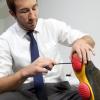At a meeting at The Royal Society of Medicine this week, a new therapy known as Orthokine was described by Consultant Orthopaedic Surgeon, Professor Wehling. Orthokine takes advantage of the body's own natural healing mechanism. The technique could improve the quality of life for some of the 6 million people living with osteoarthritis in the UK.
The new treatment is a biotechnology-based method in which proteins that inhibit inflammation and cartilage destruction are obtained from the patient's own (autologous) blood and injected back into the affected joint.
According to Prof Wehling, a recent independent study has demonstrated that autologous conditioned serum (orthokine) is an effective treatment for knee osteoarthritis. "Orthokine considerably improves clinical signs and symptoms of osteoarthritis and that the effects are significantly superior to those of conventional treatments currently available to patients in the UK."
It was said that the effect on patients' quality of life including a reduction in pain and increased function and mobility are felt for up to two years. Follow up research has even shown a positive effect in 40% of patients after four years.








